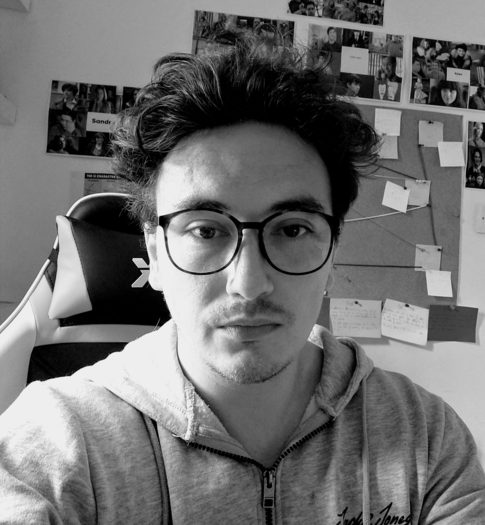The months of 2020 seem to pass so quickly, given the fact that there’s so little variation in our everyday routines nowadays. We have a little under two months to go until 2021, which seems rather incredible. As for the month of October, our big winner was not a horror film, but a psychological thriller: Monomania. We had a quick chat with director L.A. Reilly.
JL: My congratulations for your excellent film! It was a tight race, but Monomania won the most jury votes this month. How have audiences generally perceived your project?
LAR: Thank you. To be honest not too many people have seen it bar friends, colleagues and collaborators. So I suppose most input I have had has been somewhat analytical and perhaps biased. Before screening at TMFF the film has had just the one showcase at a local monthly film screening but from the audience of whom I did speak to were complementary and curious as to the narrative and how it was shaped. I’m enamoured by cinema that leaves you asking questions but if you break it down to its basic structure you’ll see it isn’t all that complex. So in short, so far so good.
JL: What did you have in mind first: the concept, the atmosphere, the character of Rebecca, the twist? Something else?
LAR: The concept was definitely the first thing as I conceived the idea seven or eight years earlier and the initial ‘protagonist’ was a man with the narrative somewhat different. The film had always been intended to be a non-linear narrative cut up as a puzzle to seduce the audience until its end. However, when I wrote the first few drafts all those years back, I was intimidated by the proposition of making it and didn’t have the confidence or the know-how to do it justice. It wasn’t until years later where I was scouting a location for another project that I came across this phenomenal house that would be the first ‘character’ that I would indeed cast. Then with having matured a few years and having learned from several more projects: the narrative, the mise-en-scene, Rebecca’s development and indeed the twists and turns seemed to ebb and flow in all stages of production.
JL: The tense, claustrophobic atmosphere reminded me somewhat of David Lynch – Mulholland Drive in terms of plot, and Inland Empire in terms of ambiance. Any films, writers or directors that have inspired you for this project?
LAR: If you were to ever come across my first films made ten plus years ago, you would indeed see a huge Lynch influence on my work. It wasn’t until we were creating the music and soundscape for Monomania did I realise how Lynchian it was. So subconsciously his work has clearly had an impression on me; I’m a huge admirer of ‘Mullholland Drive’ and ‘Blue Velvet’ in particular. I think Fincher’s work is also a huge influence, he is a master of creating atmosphere in his films and he seldom has a flaw to his credentials. Anything Kubrick – especially ‘Eyes Wide Shut’ and ‘The Shining’. Darren Aronofsky’s ‘Black Swan’ was a huge inspiration also and coincidentally so was ‘Mother’ which happened to be released the week before we were due to shoot. There are a plethora of films I could draw from for the look and feel of the film, but I also revisited films which focused less on style somewhat and more on character as the actors performance was integral to the film. Noam Baumbach’s ‘Margot at the Wedding’, Sam Mendes’ ‘Revolutionary Road’, Lynne Ramsey’s ‘We need to talk about Kevin’ and a lot of Ingmar Bergman’s work showcase some great female led pieces with brilliant psychological performances.
JL: I thought that Monomania has both a thoughtful character arc, as well as an eerie atmosphere. It’s quite a common pitfall to have one but not the other, so how have you managed to balance these two out?
LAR: For me that is the greatest compliment I could get for this film, so thank you. It was hellish to balance and achieve the two and I knew the film could easily be ruined should something slip. The shoot was a gruesome one with a skeletal crew with us all staying in that house for the three and a half days we shot. It was as if we became a part of the film, but that led to the actors being able to immerse themselves further into their characters. As I mentioned earlier, the actors performance was integral, as you had to be captivated with their nuances as their roles changed. I met all three before we filmed and discussed the roles in length and together we created backstories and used personal experiences for them to draw from when filming. I think I was very fortunate to have had a good understanding with all three of them and we all trusted each other. Once that trust is established in pre-production, that allows you to manage the shoot more efficiently. You also have to have people you can trust in your crew, and we had a great producer who was also the camera operator and a talented DOP who lit the scene beautifully. Then you had the combined genius of our composer and sound designer and voila. It’s a cliche, but it does ultimately take a good team and I had a few regular collaborators and friends on board helping me.
JL: Something else I really appreciated is that you don’t spoon-feed the audience, but respect their intelligence and ability to piece things together. Do you find it difficult to resist overexplaining things in your projects?
LAR: It grates me when films give you all the answers. It also baffles me as the films regarded as some of the greatest rely on the audience to deduce things for themselves but today’s cinema tends to be style over substance and the narrative is pretty much disregarded, this is quite scary as a filmmaker of my ilk – thankfully we have steaming channels for original content. I actually find it a lot easier not telling the audience everything. Life is never sure and we are quizzical creatures by nature, so why shouldn’t film feed into these natural intrigues?
JL: What’s your golden rule with regard to writing a plot twist?
LAR: I’m not sure I have one. I tend to know the theme and how the film ends and how that could intrigue an audience. Then it’s figuring out how we get there, everything in the middle. So it’s writing and rewriting and constant crippling self doubt as to whether it makes sense. The truth is you need to have enough confidence in your idea to see it through and you’ve just got to hope that people understand it and you haven’t gone too avant garde.
JL: What would you say has been the main learning point for you as a filmmaker after writing and directing Monomania?
LAR: Monomania was may 16th fictional project having spent the previous decade of my life undertaking various projects to learn from. Monomania was probably the first project I undertook to not learn anything if that makes sense. Me undertaking this project was basically a huge punt for my own self belief as I invested a lot of time and money into this one and I wanted to make it to take me to the ‘next step’ in my career. But after the fact I suppose the main thing I did find was a new found confidence in my story-telling. It may sound arrogant but I don’t think I learned anything new technically with Monomania as I was prepping for this project for several years and had learned so much from previous projects and from projects since. But Monomania was a genre I had tried and failed at a few times and only came back when I knew I could handle it.
JL: Laura Hamisultane was excellent in her role, and deservedly won our Best Actress award. Have you worked with her before?
LAR: She is phenomenal. One of the most stunning and organic performances I’ve had the pleasure to direct. She was so giving as an actor and carried the film through whilst showing vulnerability throughout. On set she was as tired and mentally drained as anyone, but she was constantly asking the right questions and before every scene we would tend to just talk one on one and find a way to navigate through it. I hadn’t worked with her before but she was a great find by our casting director and I would love to work with her again when the right project presents itself. Of course any actor’s performance is a reflection of those they are feeding from and to and therefore it’d be remiss of me to not point out the great performances of Pat Lally and Jasmine Sumner also, who, for me, were the perfect trio. I’d work with this cast again in a heartbeat.
JL: We’ve just been placed in another lockdown. Are you going to use this time to get some writing done on new projects?
LAR: It’s a difficult one at the moment as I don’t really want to undertake any short projects that I don’t see developing me as a filmmaker. So I am being meticulous with what I select with the view to writing my first feature in the next couple of years. With that said, we were/are producing a short ‘one-take’ film of a similar psychological genre, where I can attempt to orchestrate the camera with the actors as I feel it’ll allow me to learn even more about camera language – alas the lockdown keeps pushing us back. Then we have another short film in the very latter stages of post-production called ‘Reuben’ which is a magical fantasy following one performance of a clown and his daughter. Hopefully we will be able to share this with you early next year.
JL: Many thanks for your time, and congratulations once again for the great work! Whenever you have a new film, please feel free to return to TMFF – we’re excited to see more!
LAR: Thank you. If anyone would like to check me out or discuss the project, you can find me at my website: www.leeanthonyreilly.co.uk. Thanks again.
















